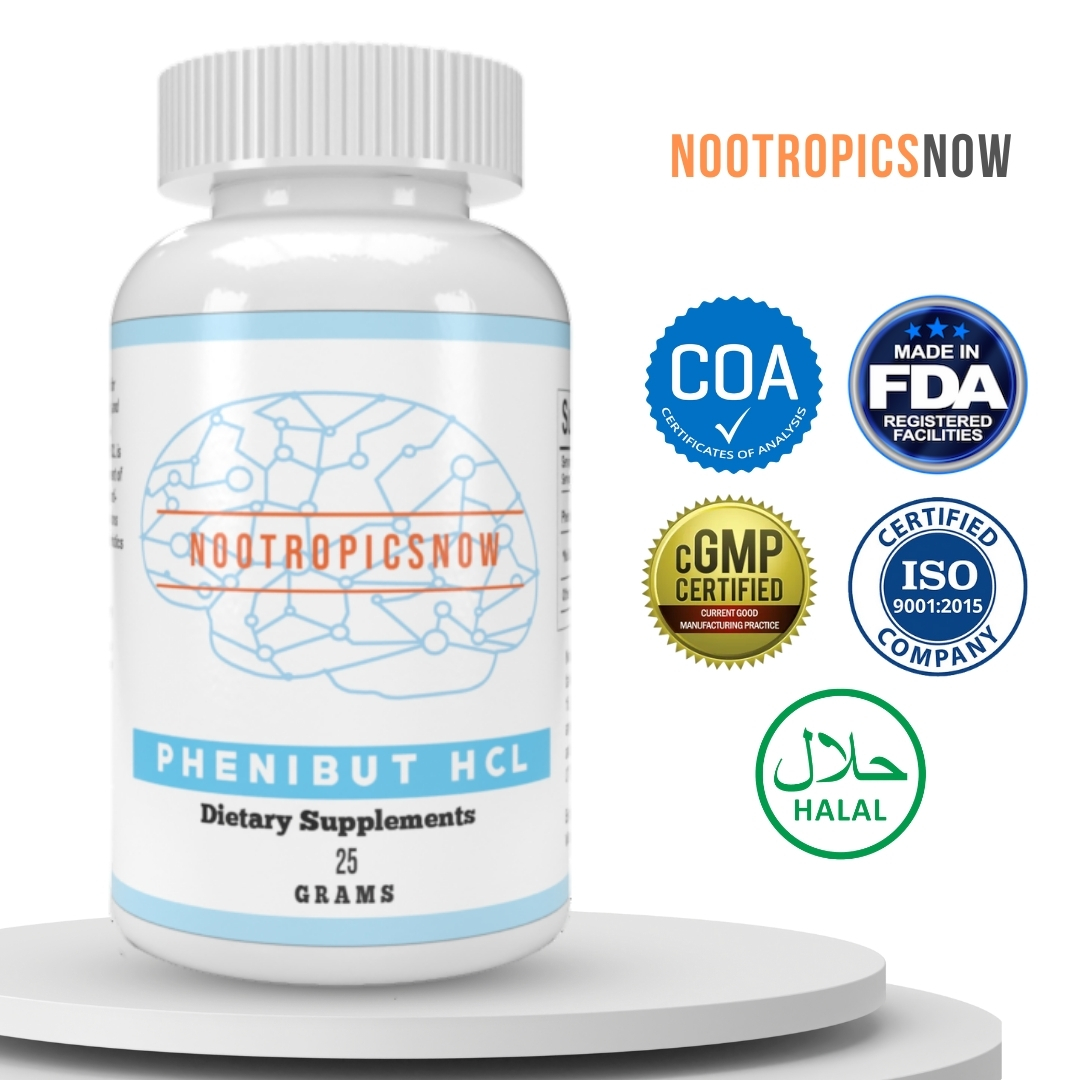Phenibut HCL: Effects, Benefits & Risks

Phenibut HCl Effects: A Deep Dive
Phenibut HCl, chemically known as β-phenyl-γ-aminobutyric acid hydrochloride, stands as a synthetic derivative of the naturally occurring inhibitory neurotransmitter, gamma-aminobutyric acid (GABA). It has garnered attention for its anxiolytic, sedative, and nootropic properties. While initially developed and utilized in Russia as a pharmaceutical agent, its use has spread globally as a research chemical and dietary supplement. Consequently, understanding the effects of Phenibut HCl is crucial for both potential users and healthcare professionals.
The Science Behind Phenibut HCl: Mechanism of Action
The primary mechanism through which Phenibut HCl exerts its effects involves the GABAergic system. Specifically, it acts as a GABA-mimetic, binding to GABA(B) receptors and, to a lesser extent, GABA(A) receptors in the brain. This interaction potentiates the inhibitory effects of GABA, effectively reducing neuronal excitability and promoting a state of relaxation and calmness.
Additionally, Phenibut HCl possesses a unique structural feature that allows it to cross the blood-brain barrier, something that GABA itself struggles to do. This feature enables it to directly influence brain activity, resulting in more pronounced and widespread effects compared to GABA supplements. Furthermore, Phenibut HCl modulates dopamine release, particularly at lower doses, contributing to its mood-enhancing and cognitive-boosting properties. However, it’s worth noting that the exact mechanisms are still being researched, and more investigations are required for full clarification.
Anxiolytic Effects: Calming the Mind
One of the most widely recognized effects of Phenibut HCl is its ability to reduce anxiety. By enhancing GABAergic neurotransmission, it helps to dampen the neuronal activity associated with anxiety and stress. Many users report a noticeable decrease in feelings of worry, tension, and unease after taking Phenibut HCl. Consequently, it has been employed to manage social anxiety, generalized anxiety disorder (GAD), and other anxiety-related conditions.
However, it is crucial to exercise caution and avoid relying on Phenibut HCl as a long-term solution for anxiety. Prolonged use can lead to tolerance, requiring higher doses to achieve the same effects, and increasing the risk of dependence and withdrawal symptoms. A combination of Phenibut with other supplements like L-Theanine can also work as a relaxation agent.
Sedative and Sleep-Promoting Effects
Due to its GABAergic activity, Phenibut HCl also exhibits sedative properties. It can promote relaxation, reduce restlessness, and improve sleep quality. Therefore, it has been used as a sleep aid for individuals struggling with insomnia or other sleep disorders.
View Product
Users often report experiencing a deeper, more restful sleep after taking Phenibut HCl. However, it’s important to note that the sedative effects can vary depending on the dosage and individual sensitivity. At higher doses, Phenibut HCl can cause excessive drowsiness and impair cognitive function. Furthermore, the sleep-promoting effects may diminish with regular use due to tolerance.
Nootropic Effects: Enhancing Cognitive Function
In addition to its anxiolytic and sedative properties, Phenibut HCl has been reported to possess nootropic effects, meaning it can enhance cognitive function. Some users claim improved memory, focus, and learning ability after taking Phenibut HCl. These effects are thought to be related to its modulation of dopamine release and its ability to enhance neuronal communication in the brain.
View Product
However, the nootropic effects of Phenibut HCl are not consistently observed across all users. Some individuals may experience cognitive benefits, while others may not notice any significant changes. Additionally, the nootropic effects may be more pronounced at lower doses and can diminish with higher doses due to sedation.
Mood Enhancement and Euphoria
Phenibut HCl can also induce mood-enhancing and euphoric effects, primarily through its influence on dopamine release. Many users report feeling more positive, motivated, and confident after taking Phenibut HCl. These effects can contribute to its recreational use, as some individuals seek it out for its pleasurable sensations.
However, it’s crucial to recognize that the mood-enhancing effects of Phenibut HCl can be unpredictable and may not occur in all individuals. Furthermore, prolonged use can lead to emotional blunting and a diminished capacity to experience pleasure naturally.
Potential Side Effects and Risks
While Phenibut HCl can offer several potential benefits, it’s also associated with a range of side effects and risks, particularly with long-term or high-dose use. These side effects can vary in severity and may include:
Dosage and Administration
The appropriate dosage of Phenibut HCl varies depending on individual factors, such as weight, sensitivity, and desired effects. Generally, a starting dose of 250-500mg is recommended, taken once or twice per day. However, some individuals may require higher doses to achieve the desired effects.
View Product
It’s crucial to start with the lowest effective dose and gradually increase as needed, paying close attention to any side effects. It’s also important to avoid taking Phenibut HCl more frequently than recommended, as this can increase the risk of tolerance and dependence.
Phenibut HCl is typically taken orally, with or without food. However, taking it on an empty stomach may result in faster absorption and more pronounced effects. Some users mix it with water or juice to improve its palatability.
Interactions with Other Substances
Phenibut HCl can interact with other substances, including alcohol, benzodiazepines, and other sedatives. These interactions can potentiate the sedative effects of Phenibut HCl, increasing the risk of respiratory depression and other complications.
It’s crucial to avoid combining Phenibut HCl with alcohol or other sedatives. If you are taking any medications, it’s essential to consult with a healthcare professional before using Phenibut HCl to ensure there are no potential drug interactions.
Legal Status and Availability
The legal status of Phenibut HCl varies depending on the country. In some countries, it is a prescription medication used to treat anxiety, insomnia, and other conditions. In other countries, it is available as a research chemical or dietary supplement.
In the United States, Phenibut HCl is not approved by the Food and Drug Administration (FDA) for any specific medical use. It is sold as a dietary supplement, but its labeling and marketing are not subject to the same regulations as prescription medications.
Dependence and Withdrawal Management Strategies
Given the risk of dependence and withdrawal associated with Phenibut HCl, it’s crucial to implement strategies to minimize these risks. These strategies include:
Alternative Supplements with Lower Risk
Recognizing the potential risks associated with Phenibut HCl, it’s crucial to consider safer alternatives for managing anxiety, improving sleep, or enhancing cognitive function. Several natural supplements offer similar benefits with a lower risk profile.
Responsible Use and Harm Reduction
If you choose to use Phenibut HCl, it’s crucial to do so responsibly and with harm reduction in mind. This includes:
The Future of Phenibut HCl Research
The potential benefits and risks of Phenibut HCl warrant further research to determine its optimal use and minimize its potential harms. Future research should focus on:
By conducting rigorous research, we can gain a better understanding of the potential benefits and risks of Phenibut HCl and develop strategies to use it safely and effectively.
In conclusion, Phenibut HCl can offer several potential benefits, including anxiolytic, sedative, nootropic, and mood-enhancing effects. However, it is also associated with a range of side effects and risks, including drowsiness, nausea, headache, fatigue, tolerance, dependence, and withdrawal. If you choose to use Phenibut HCl, it’s crucial to do so responsibly, with harm reduction in mind, and under the guidance of a healthcare professional. By following these guidelines, you can maximize the potential benefits of Phenibut HCl while minimizing its potential harms.
Phenibut HCl Effects: A Detailed Exploration
Phenibut HCl (β-phenyl-γ-aminobutyric acid hydrochloride) is a synthetic nootropic and anxiolytic drug structurally similar to the neurotransmitter GABA (gamma-aminobutyric acid). Primarily utilized to alleviate anxiety, improve sleep, and reduce tension, Phenibut HCl is available in many countries, although its legal status varies. Understanding the multifaceted effects of Phenibut HCl, along with its potential risks, is crucial for responsible use.
Primary Mechanisms of Action
Phenibut HCl exerts its effects through two primary mechanisms. First, it acts as a GABA(B) receptor agonist, meaning it binds to and activates these receptors in the brain. GABA is the brain’s primary inhibitory neurotransmitter; hence, activating GABA(B) receptors leads to a reduction in neuronal excitability, which results in calming, anxiolytic, and muscle-relaxant effects.
Secondly, Phenibut HCl also has some affinity for GABA(A) receptors at higher concentrations. GABA(A) receptor activation further contributes to its sedative and anxiolytic properties. Additionally, Phenibut influences dopamine release, particularly at lower doses, which contributes to its mood-enhancing properties. Therefore, the effects of Phenibut HCl are complex, arising from its interaction with GABAergic and dopaminergic systems within the central nervous system.
Anxiolytic (Anti-Anxiety) Effects
The most well-known effect of Phenibut HCl is its ability to reduce anxiety. By activating GABA receptors, Phenibut HCl helps to calm neuronal activity, reducing feelings of stress, worry, and apprehension. Consequently, users often report a sense of relaxation, reduced social anxiety, and an overall improvement in mood. Several studies have demonstrated its effectiveness in treating anxiety disorders, although clinical research is still limited, because of the older nature of some studies.
However, it’s important to acknowledge that Phenibut HCl’s anxiolytic effects are not immediate. Usually, it takes several hours (typically 2-4) after ingestion for the effects to become noticeable. Moreover, the duration of these effects can last for many hours, making it a potentially long-acting anxiolytic.
Sedative and Sleep-Promoting Effects
Due to its GABAergic activity, Phenibut HCl acts as a sedative, making it effective in promoting sleep. It can shorten the time it takes to fall asleep, increase the depth of sleep, and reduce nighttime awakenings. For individuals struggling with insomnia or disrupted sleep patterns, Phenibut HCl can be a useful tool for improving sleep quality.

View Product
Nevertheless, users should proceed with caution when using Phenibut HCl as a sleep aid. Dependency and tolerance can develop rapidly with regular use, leading to withdrawal symptoms upon cessation. Therefore, it’s best to use Phenibut HCl sporadically rather than as a nightly sleep aid.
Cognitive Effects
While primarily known for its anxiolytic and sedative properties, Phenibut HCl can also exert cognitive effects, particularly at lower doses. Many users report improvements in focus, concentration, and mental clarity. The dopamine-releasing properties of Phenibut HCl may contribute to these cognitive-enhancing effects.
However, higher doses of Phenibut HCl can impair cognitive function, leading to drowsiness, confusion, and impaired judgment. Therefore, it’s crucial to experiment with different dosages to determine the optimal dose for cognitive enhancement without experiencing unwanted side effects.
Muscle Relaxant Effects
Phenibut HCl possesses muscle relaxant properties due to its GABAergic activity. By reducing neuronal excitability, it can help to relax tense muscles and relieve muscle spasms. This effect can be beneficial for individuals experiencing muscle tension, back pain, or other musculoskeletal conditions.
Mood Enhancement and Euphoria
Some users report mood-enhancing and euphoric effects from Phenibut HCl, particularly at lower doses. This is likely due to its influence on dopamine release. By increasing dopamine levels in the brain, Phenibut HCl can induce feelings of pleasure, well-being, and motivation.
However, it’s crucial to note that these effects are not universal. Some users may not experience any noticeable mood enhancement, while others may experience dysphoria or other negative mood changes. Additionally, the euphoric effects of Phenibut HCl can contribute to its abuse potential.
Dosage Guidelines
Finding the optimal dosage of Phenibut HCl can be tricky, as it varies significantly from person to person. Factors such as body weight, individual sensitivity, and desired effects all influence the ideal dosage. It is always best to start with a low dose and gradually increase it until the desired effects are achieved.
Typically, a starting dose of 250-500mg is recommended. If no noticeable effects are felt after 2-4 hours, the dose can be gradually increased by 250mg increments. Most users find that a dose of 500mg-1500mg is sufficient for achieving the desired effects.
However, it’s crucial not to exceed a daily dose of 2000mg, as higher doses significantly increase the risk of side effects and withdrawal symptoms. Moreover, it’s important to space out doses throughout the day rather than taking one large dose, as this can help to minimize side effects and prolong the duration of effects.
Side Effects
While Phenibut HCl can provide numerous benefits, it’s also important to be aware of its potential side effects. Common side effects include:
Less common but more severe side effects include:
Tolerance and Dependence
One of the most significant risks associated with Phenibut HCl use is the development of tolerance and dependence. With regular use, the brain adapts to the effects of Phenibut HCl, requiring higher doses to achieve the same effects. This can lead to a vicious cycle of increasing doses, which further exacerbates the risk of side effects and withdrawal symptoms.
Dependence occurs when the brain becomes reliant on Phenibut HCl to function normally. When Phenibut HCl is discontinued abruptly, the brain experiences a withdrawal syndrome, characterized by anxiety, insomnia, agitation, and, in severe cases, seizures.
Withdrawal Symptoms
Phenibut HCl withdrawal can be extremely unpleasant and even dangerous. Common withdrawal symptoms include:
Due to the severity of withdrawal symptoms, it’s important to taper off Phenibut HCl slowly under the guidance of a healthcare professional. A gradual reduction in dosage can help to minimize withdrawal symptoms and prevent complications.
Contraindications and Precautions
Phenibut HCl is not suitable for everyone. Certain individuals should avoid using Phenibut HCl altogether, including:
It is crucial to consult with a healthcare professional before using Phenibut HCl, especially if you have any underlying health conditions or are taking other medications.
Legal Status and Availability
The legal status of Phenibut HCl varies depending on the country. In some countries, such as Russia, it is a prescription medication. In other countries, such as the United States, it is sold as a dietary supplement and is available without a prescription. However, its legal status may change, and it’s important to check local regulations before purchasing or using Phenibut HCl.
The availability of Phenibut HCl also varies depending on the country. In some countries, it can be purchased from pharmacies or online retailers. In other countries, it may be more difficult to obtain.
Responsible Use
If you choose to use Phenibut HCl, it’s important to do so responsibly to minimize the risk of side effects and withdrawal symptoms. Here are some tips for responsible use:
Conclusion
Phenibut HCl is a complex drug with both potential benefits and risks. While it can provide relief from anxiety, improve sleep, and enhance cognitive function, it also has the potential to cause side effects, tolerance, dependence, and withdrawal symptoms. It is essential to approach Phenibut HCl with caution and use it responsibly to minimize the risk of harm. Always consult with a healthcare professional before using Phenibut HCl, especially if you have any underlying health conditions or are taking other medications. By following these guidelines, you can safely explore the potential benefits of Phenibut HCl while minimizing the risk of adverse effects.


